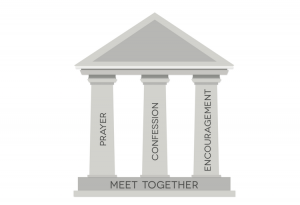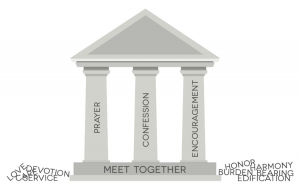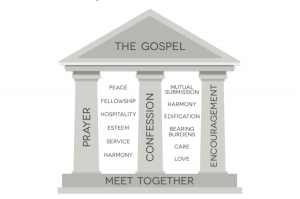For a Christian, accountability plays a crucial role in personal growth and holiness. But accountability groups and partners aren’t magic pills, and there are many pitfalls that often lead to the failure of Christian accountability relationships.
Before we get to five ways Christian accountability often goes bad, let’s do a quick review of what accountability actually is and should consist of.
The Building Blocks to Christian Accountability
There are four key building blocks that give shape to our Christian accountability relationships. These building blocks are based on James 5:16 and Hebrews 10:23-25: meeting together, confession of sin, prayer, and encouragement. Meeting together is the foundation that supports the pillars of prayer, confession, and encouragement.

But when these pillars don’t function properly or lack the underlying foundation, the whole structure of Christian accountability comes tumbling down. With this context, let’s get into common problems Christians have when trying to hold each other accountable.
Problem #1: When Accountability Partners Are Absent
Accountability relationships need to be fostered through time together. It is hard to hold one another accountable when partners meet infrequently or sporadically (or not at all).
Often both parties are at fault. We might commit to “holding one another accountable,” but this is something vague, elusive, and undefined. Accountability partners need to have a very clear picture in their minds about what accountability really entails: face-to-face, voice-to-voice conversation.
When accountability partners do not meet in some fashion, the accountability relationship has no foundation. This means confession, prayer, and encouragement are erratic and shaky, at best.

Problem #2: When Accountability Groups Are Programmatic
When we read through the New Testament, one cannot help but see the organic, family dynamic that is meant to exist in the church. We are called to an earnest love for one another (1 Peter 1:22), brotherly affection (Romans 12:10), single-minded unity (Romans 15:5), eating together (1 Corinthians 11:33), bearing each other’s burdens (Galatians 6:2), and having the same care for each other (1 Corinthians 12:25).
But often our approach to accountability is programmatic. We simply don’t have the quality of friendships that are close and spiritually meaningful, so we search for it in forced and sometimes awkward settings.
The church, of course, should offer support groups and discipleship models. “Program” is not a four-letter word. But these programs should aim toward something rich and natural.

If meeting together, prayer, confession, and encouragement are the building blocks of accountability, then the rest of your accountability relationship will naturally fall into place. This should not be an empty, austere structure, but filled with the air of Christian love and friendship. You may be “doing everything right” but it still feels empty and cold.
Problem #3: When Accountability Partners Are Sincerity-Centered
Confession is the central pillar of accountability, but there are a few ways this pillar can be constructed poorly.
The first way confession of sin can go wrong is when it becomes an end in and of itself. This is when we believe confession is the only point of accountability, something we do to put to rest our uneasy consciences and get something off our chests. These kinds of accountability relationships make “getting the secret out” the whole point.
As therapeutic as this might feel—and it is therapeutic—we need to be careful that in our confession of sin we don’t trivialize sin as something that resolves itself with mere sincerity. Jonathan Dodson, pastor of Austin City Life church, says that one surefire way to ruin your accountability relationship is by making it “a circle of cheap confession by which you obtain cheap peace for your troubled conscience.”
Christians do not believe that pardon from sin comes from merely being honest about sin. Your sincerity wasn’t nailed to a Roman cross for your sins; Christ was. Peace with God comes only by leaning on what Christ has done for us (Romans 5:1). We often mistake the relief of unleashing our secrets with true peace.

Conversation must not stop at confession. The outermost pillars of the Christian accountability relationship call us to prayer and encouragement. After humble confession, we should encourage one another with the assurance of forgiveness promised in the gospel, and we should approach God’s throne of grace in prayer together.
In this way, we not only hold one another accountable for our behavior, but we also hold one another accountable for trusting in the gospel for our complete forgiveness.
Problem #4: When Accountability Partners Are Obedience-Centered
The first way the pillar of confession can be built poorly is when we aim at cheap peace. The second way the pillar of confession can be constructed poorly is when the focus is on moral performance.
Some Christian accountability groups are militant about sin—a healthy attitude in its own right. Members want to see others grow in holiness, so this becomes the focus of the group: questions and answers that deal with obedience.
The problem is, mere rule-keeping does not itself get to the heart of sin. This is one of the great lessons Paul teaches again and again. Merely knowing the law only aggravates our lusts (Romans 7:7-12), and following rigid ascetic regulations—don’t touch, don’t taste, don’t handle—is “of no value in stopping the indulgence of the flesh” (Colossians 2:20-23).
What we need is a kind of accountability that corrects our natural tendency to focus on ourselves—our own performance or lack of performance—and instead focus on Christ and His obedience in our place.
Don’t turn the pillar of confession into a pedestal—a place where we can prop up the idol of our own obedience. Don’t turn biblical accountability into a narcissistic program of self-improvement. Accountability relationships like this either center our thoughts on a few benchmarks of success that we might happen to be reaching, or force us into hiding because we don’t want to admit how much we are failing to hit the mark.

Problem #5: When Accountability Partners Forget the Gospel
Whether you slide toward being sincerity-centered or obedience-centered, both tendencies have ignored that the gospel is the capstone of accountability.
When we make our groups all about sincere confession with no expectation of change, we trivialize the very sins that were nailed to Jesus on the cross. When we confess the same sins week after week, say a quick prayer, and go home, we merely highlight the cheap peace we feel from refreshing honesty, and we forget to comfort each other with a testimony of God’s grace of forgiveness. We forget to challenge each other to fight sin in light of the motivations God provides in His Word.
When we make our groups all about obedience, we only reinforce our tendency to center our identity on our performance. This either drives us to rigid moralism or hiding the evil that lurks in us from others and ourselves. Either way, these kinds of accountability relationships only reinforce legalism and self-absorption. This robs us of the joy of building our identity on Christ’s obedience, and we lose an opportunity to speak about the grace of God that trains us to be godly.
This is why the gospel is the capstone of good biblical accountability. Our confessions, prayers, and encouragement should all be done under the canopy of what the gospel promises God’s children.
- Confess your sins in light of the gospel. One aspect of repentance is agreeing with what God says about your sin, labeling your sin as truly sinful, as an affront to His holiness, something that cost Christ his life. Confess your sins to God and others knowing He is faithful and just to forgive you and cleanse you (1 John 1:9).
- Pray together in light of the gospel. The gospel promises both grace to cover our sins (Romans 5:1-2) and grace to empower our obedience (Titus 2:11-14). Approach Christ together asking for this grace (Hebrews 4:16).
- Encourage one another in light of the gospel. Knowing that true internal change happens in our lives as we set our minds and affections on things above—the complete redemption that is coming to us (Colossians 3:1-4)—we should help one another do this. Mining the Scriptures together, we can teach and admonish one another in wisdom (v.16). We can strive together to have more of a foretaste of the holiness we are promised in the age to come.

We need responsive, gospel-driven accountability. If we want to get Christian accountability right, we need to not only hear an account of our friends’ sins, but give an account of God’s grace—a grace that not only saves us from the guilt of sin, but also from the grip of sin.








I keep staring at and analyzing the diagram. Its causing me to to analyze what a group structure should look like, what my own needs are and what is lacking now. I’d like to draw a picture but being tech challenged I’ll just do the best I can to describe it.
I believe the bed rock of the structure should be gospel conversion.Who needs to confess be encouraged and pray if not a follower? In typical church(sunday morning) the bed rock is Meet then no pillar of confession some prayer maybe encouragement but not personal. In a Catholic church there is a bed rock of Confession but no pillar of prayer and encouragement. I would like to fashion a group with a bed rock of gospel conversion then a floor of meet together then pillars of confession, prayer and encouragement holding up a roof of forgiven freedom maturity purity in Christ ( couldn’t think of a single word for the roof ) Thanks for helping me think through whats happening to me and what I am missing.
How do i find an accountabilith partner. I really want help
Hi, is there a 12-step program that you can join as a starting point? What about an online support group like NoFap? I wish you the best.
What do I do when the accountability partner makes me feel like crap and preaches a sermon without letting me get a word in edgewise? I want to “fire” him but not lose that friendship.
It’s your choice. It doesn’t sound like you have an accountability partner right now. So, maybe keep the friendship, stop sending him the reports, and find someone else for that specific role.
feeding from the word of God we delight i
n God
A timely word, as ai prepare to engage in some accountability within my church.
Peace,
Rich
I agree that there are many pitfalls with having an accountability partner. Having been in a church for many years that required discipling partners, I found that the Greatest pitfall was pride…..Usually, it was the “leader” who rather than loving they were very legalistic. Frankly, although there is some evidence to support “accountability partners” in the bible (Proverbs 27:17) there is also evidence refuting such a practice (1 Corinthians 1 and 1 Corinthians 3). I have the conviction that having people in my life to help, encourage, teach and even, at times, to direct is important, but I also have the conviction to have a formal “discipling” or “accountability partner” type relationship is biblically inaccurate.
I think you left out James 5:16
“Therefore confess your sins to one another, and pray for one another, that you may be healed. The prayer of a righteous man has great power in its effects.”
Can you please highlight the specific passages to which you refer? Both of the chapters of Corinthians you mentioned talk about unity within the church, avoiding strife over leadership, and not being proud of your good deeds. for The message of these chapters is simply God working in us that produces the good, and so he is the one worthy of praise, not ourselves or any leader in particular. I think you are very far from the mark, and if you are preaching a message contrary to this, you are likely leading people astray. I would consider diving deeper into the word, before posting anything on the internet that will harm others.
I would say that this adequately describes where I have been frustrated with accountability. We have accountability partners with Celebrate Recovery, but you have to seek them out yourself, and the effort level of most other addicts is, well, let’s just say that they are in the predicament that they are in for a lack of self discipline in the first place. My sponsor is pretty good at supporting and praying for me, and I offer up my sins easily, but he doesn’t dig much or ask difficult questions. I think he’s learning a bit as he goes. I wish there was a group that met at my church, and I’m continuing to ask around if there is a group of guys that meet for this purpose. Maybe I can introduce them to this larger resource that this article is cited from. Thanks!
I would highly recommend that, Jeremiah!
I appreciate the article and the work you’re doing with Covenant Eyes. This article will most certainly help people in accountability relationships. I read it looking for a mention of our relationship with Jesus but found none.
Hebrews 2:18 summary: “Because Jesus suffered in temptation, he’s able to help those who are suffering in times of temptation.” This verse and it’s context tell us where we must look first for help. It has huge implications for those struggling with porn.
Today’s trendy theology of “The Gospel” (which I understand and can appreciate) tends to turn our attention away from Jesus. A focus on “The Gospel” tends depersonalize “The Gospel” and the “relationship” we have with Jesus. People don’t “fall in love” with “The Gospel.”
Follow me? I’m not trying to romanticize the relationship we have with Jesus, but I’m trying to say that people aren’t called to love “The Gospel,” they are called to love God (first great command in Matthew 22:37-38).
“…Jesus Christ, whom having not seen you love…” (1 Peter 1:6-7). Amazing verse. I think too many younger Christians have fallen in love with the idea of “The Gospel.” It seems like many think it is to be our main focus. But it’s not.
While the article will certainly be a help, it needs a good dose of Hebrews 2:18 and its surrounding context.
As a counselor, I am often pointing people to these words of Jesus: “Without me you can do nothing” (John 15). (And I can’t tell you how many times I’ve pointed people to Hebrews, chapters 2-4.)
Luke, I appreciate the work you’re doing. Keep it up. You’re making a difference.
Admittedly, this is an excerpt from a larger resource. In the fuller document, we ask accountability partners to focus not on the gospel as an abstract concept but asking people to rest completely in what Christ has done for them—not obsessing about their own failures nor putting stock in their own performance. I agree that we absolutely make clear what we mean by the gospel—not just a message, but a living person.
Thank you Luke for compiling this. God has blessed you with great thought articulation. I am a lay youth pastor, sending this article and putting into practice with my high school boys has been great. I’m sure fruit will be formed real soon.
Thanks for sending this.
-Will
Great, Will. Hope it bears fruit in their lives!
Luke,
I just wanted to say how much I like this article. I’ll be getting a copy of this ebook, and sharing it liberally.
Brian
Wonderful, Brian. Glad you liked this.
I have been engaged in accountability and discipleship for 25 years, thanks for the great truth and reminders. Always need to refocus on truth and have a big picture view
Thanks, Larry!